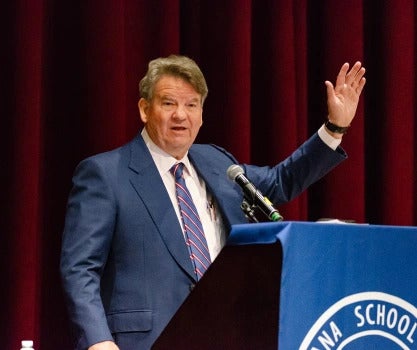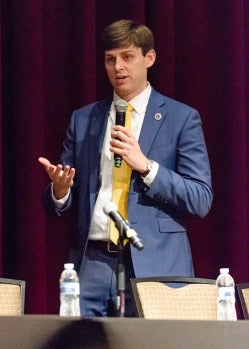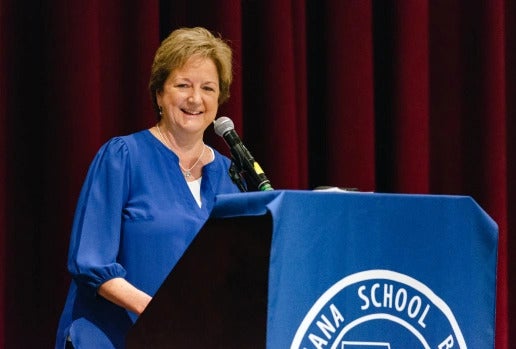Governor candidates focus on future of public education in Louisiana
Published 11:03 am Friday, March 10, 2023
|
Getting your Trinity Audio player ready...
|
BY CRYSTAL STEVENSON
AMERICAN PRESS
SPECIAL TO L’OBSERVATEUR
LAKE CHARLES—Three of seven candidates running for the office of governor spoke Thursday morning to Louisiana School Board Association members about their views on public education. A fourth candidate appeared via video.
The candidates — state Sen. Sharon Hewitt, Attorney General Jeff Landry, attorney Hunter Lundy and state Rep. Richard Nelson — appeared during the association’s annual convention, held this year at Golden Nugget Casino Resort.
“People ask me all the time, ‘Why are you running?’ Well, our two sons went to out-of-state colleges, they’re working for companies out of state and they will probably never move back to Louisiana because there weren’t opportunities here for them,” Hewitt said. “What I want is a Louisiana where our families want to work here, and live here and retire here. Our sons were born and raised here and it breaks my heart that there aren’t opportunities here for them in Louisiana. As governor, I’m going to change that.”
The Lake Charles native and Barbe High School graduate said she has five areas she wants to focus on if elected governor — creating a world-class education system rich in technology to build “the workforce of tomorrow”; growing the economy with strong infrastructure and a tax system that “respects your hard-earned tax dollars”; affordable and reliable insurance and energy; safer neighborhoods and communities; and protecting personal freedoms.
Hewitt said Senate Bill 22, which she sponsored, passed two years ago and goes into effect next year.
“This bill establishes for the first time in state history a uniform way of reporting how well students are reading,” she said. “We’re going to be checking that three times a year and there will be processes in place and opportunities for parents to know how well their children are reading. We are also teaching students who are studying higher education in higher education institutions the science of reading so they are ready to hit the ground running when they come into your school systems. These are all things are actually happening.”
Hewitt said by the end of her first term as governor, all kindergarten through third grade students will be reading.
She also vowed to bring computer science courses to every grade level to get Louisiana students ready for the global economy.
“Louisiana students are getting left behind,” she said. “Louisiana is 49th in the percentage of high schools offering a computer science class. To show you how much of an opportunity we are missing, last year in Louisiana we had 5,441 jobs per month in the computer field. We have tremendous opportunities and yet we’re not filling the pipeline.” Hewitt also said she supports education savings accounts.
“I am an advocate for public schools; I’m a product of public schools, my kids are, my mom was a teacher. That’s always where my priority is going to be,” she said. “But for those children that do not succeed in a public school environment, I do believe we should give them options. It’s important to give parents choices, and parents options.”
Landry, who appeared via video, said his mother was a teacher, coach and principal.
“Why is it that 74 percent of our fourth-graders can’t read and 80 percent of our fourth-graders can’t do basic math?” he asked. “It’s because we don’t let our teachers teach and we don’t go back to the basics of reading, writing and arithmetic anymore. If we did that and allowed our teachers to teach — not teaching for a test but to teach for kids to learn and expand their way of thinking — that’s how we build a promising future.”
He said he also believes not every child should be made to go to college.
“I didn’t go to college right after high school,” he said. “I joined the Army National Guard and worked on a farm. I learned skilled. Eventually I went back to college. If we teach kids and young adults skills while they’re in elementary, junior high and high school they will at least have something to fall back on. It’s really a disservice when we send our students straight to college without a vision, without knowledge, and then they fail.”
Landry also said if the state’s education system improves, the economy will follow.
“We need to concentrate on the things that Louisiana is actually good at, like the manufacturing business we already have and our agricultural industries,” he said. “When we focus on the small and large businesses and industries that are right here in Louisiana today and we help them with new economic opportunities, that’s how we fix Louisiana.”
Lundy said if the state can’t fix its poverty problems — citing 53 percent of Louisiana’s children take part in the free lunch program at their schools, which is intended for low-income families — then the obstacles in the classroom will only worsen.
The Lake Charles native and founding partner of Lundy, Lundy, Soileau & South said “that’s always the problem in the room that no one wants to talk about.”
“We’ve let poverty be the prevailing factor in the state, so we have to go right after it,” he said. “Education is the most important thing we can do to effect change. My mother was a kindergarten teacher. She later became a professor of childhood education. She’s still teaching me today. My sister is a teacher. My daughter is a teacher. If you elect me as governor, you’ll get someone who has a heart for children, a heart for education.”
Lundy said Hurricanes Laura and Delta, as well as the COVID-19 pandemic, grossly impacted education in the state.
“We have to dig in and we have to dig out,” he said. “We have to have the biggest comeback that we’ve ever had in history. I’d use the word ‘revival.’ Maybe we need a spiritual revival and an educational revival.”
Lundy said teachers should be allowed to teach. “They’re too busy checking boxes,” he said.
Nelson, a Mandeville native and former U.S. State Department officer and diplomat, said the way to move Louisiana forward is to restructure the income tax and increase literacy among young students.
“Florida and Texas have grown six times faster than us in the last 10 years,” he said. “If we don’t do something, and something big, we’re never going to catch up to that. One of the worst statistics I can tell you is also the most eye-opening: if Louisiana was just average in the country, we would all live four years longer and get a 33 percent raise. There is an invisible line between us and Texas and if you drive across that line you become average and you’ll get three and half of your years back and you’ll get a 33 percent raise. That is the cost of bad government in Louisiana.”
Nelson said getting rid of the income tax would allow Louisiana’s districts to better fund themselves — and would make the state much more competitive.
“My friends who live just across the border in Texas tell me, ‘You don’t have to have a sign that tells you you’re in Texas. The roads are smooth, the schools are great, the police are all around, you can tell that you’re in Texas.’ Those are the problems we have here — roads, police, drainage. These are all local problems that the state doesn’t necessarily address, but if you don’t give locals the ability to fix those problems you’re not going to get anywhere.”
Nelson said there is an “obsession” with standardized testing in Louisiana and a thought that the state “can test its way out of these problems.”
“It stresses out the teachers, it stresses out the kids, it stresses out the system trying to focus on district test scores,” he said. “I think we can use these assessment tests as guides so that we have something to measure but we don’t need it how we use it now. History proves it doesn’t work.” He also stressed a need for universal pre-K availability in Louisiana. “There’s a 17-to-1 multiplier for every dollar you spend on early childhood education and the return that you get over time.”





